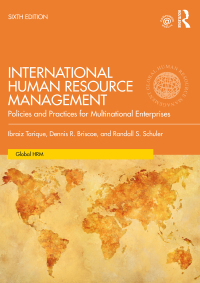It used to be necessary to bring workers to where the work was. But with the advent
Question:
It used to be necessary to bring workers to where the work was. But with the advent of the World Wide Web, the Internet, and mobile phones and video conferencing technologies such as Zoom, Cisco Webex Meetings, Microsoft Teams, and Google Meet, and the global communication they make possible, it is now possible to send work to wherever workers are by putting together multinational project teams, by using the Internet to recruit employees on a global scale, or by using open-source software to accommodate global collaboration. These new styles of work and employment are arising particularly in response to the capabilities of virtual collaboration and communication technologies, improved cyber technologies, artificial intelligence, real time analytics, cloud storage, and powerful computers, and to the chronic needs for IT and analytical skills in growing numbers of industries. Phrases like gig work, fluid work, remote work, virtual work, hybrid workplace, and activity-based work are becoming a norm. For example, one firm from Bern, Switzerland, recruited from the web a group of doctorates in discrete mathematics and graph theory from as far away as Belarus, India, Israel, and Ireland, for a semiconductor design project. Team members never left their home countries, and the team leader never left his home office. And the task group beat its deadline.
In industry after industry, as customers expect quicker service and competition forces shrink product life cycles, employers are being driven to apply a “Hollywood model” to their tasks. They assemble the best talent available at the moment from anywhere in the world (which is the way teams are put together to film a movie). When the project is complete, the team breaks up and the members move on to new projects. The end result is a new and highly efficient global labor market unlike any seen before.
Even for small businesses: their new talent pool is the world. A new generation of online services is providing small businesses with opportunities to fi nd specialized expertise and affordable labor. Main Street businesses can shop a virtual international bazaar of freelancers to recruit computer programmers in Russia, graphic designers in Italy, or data analysts in India. A small business of one can look to the world like a very large company and have access to all kinds of services. Technical advances have made remote work and virtual teams more feas ible. And, increasingly, freelancers, gig workers, and fluid workers are taking on assignments like customer service, data entry, writing, accounting, human resources, marketing, and payroll – virtually any “knowledge process” that can be performed remotely – even setting up and managing business profiles on social networking sites like Facebook and Twitter.
In some cases, the cost savings can be substantial: for example, the hourly rates of programmers in Russia, India, or Pakistan are a fraction of those in North America or Europe. And these freelance marketplaces also allow small businesses to assemble teams quickly, find specialized expertise, begin new initiatives, and then be able to drop everything when it’s no longer needed.
When John Wilde, Chief Executive of Tailor Made Products, a small manufacturing firm in a small town in Wisconsin, US, wanted to build a website for a new line of children’s kitchen gadgets called the Curious Chef, he turned to oDesk and hired a firm in India. He paid about $20,000, which he estimates was roughly half what he would have paid in the US.......
Case study questions
1. Where are the best places in the world to live (and work)? Where do you want
to live and work? Do you want to work from home? Are you interested in
working on global teams? What skills and competencies will enable someone
to live and work wherever he or she wants? Are you interested in creating or
working on a micro-multinational?
2. What are the human resource implications of these new ways of working?
Step by Step Answer:

International Human Resource Management Policies And Practices For Multinational Enterprises
ISBN: 9781138489493,9780429806124
6th Edition
Authors: Ibraiz Tarique , Dennis R. Briscoe , Randall S. Schuler




